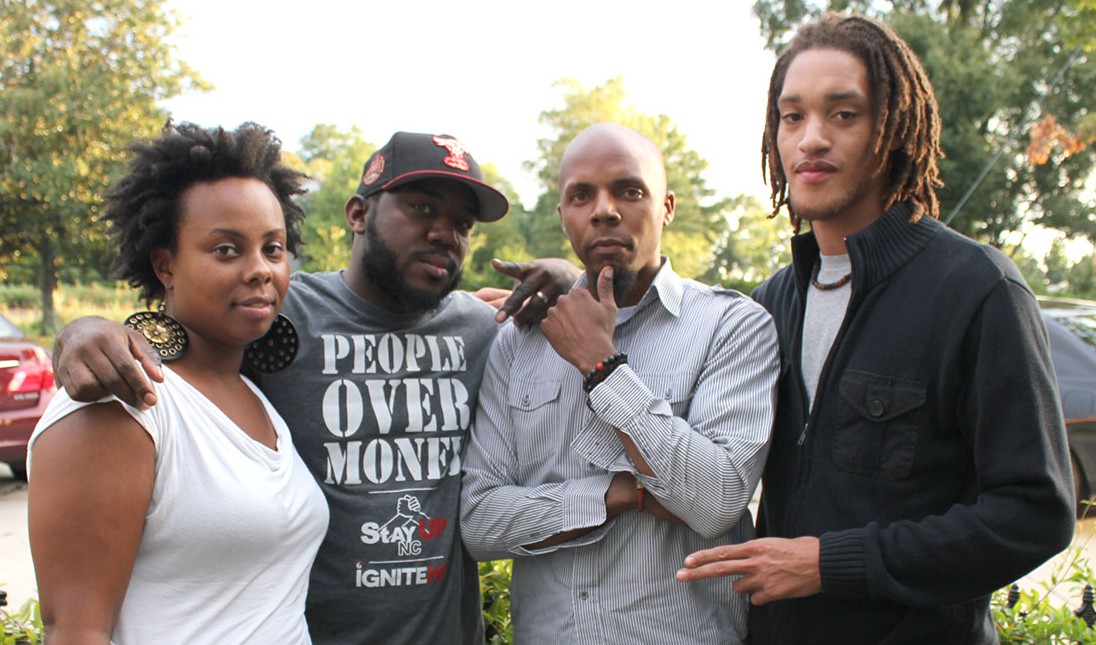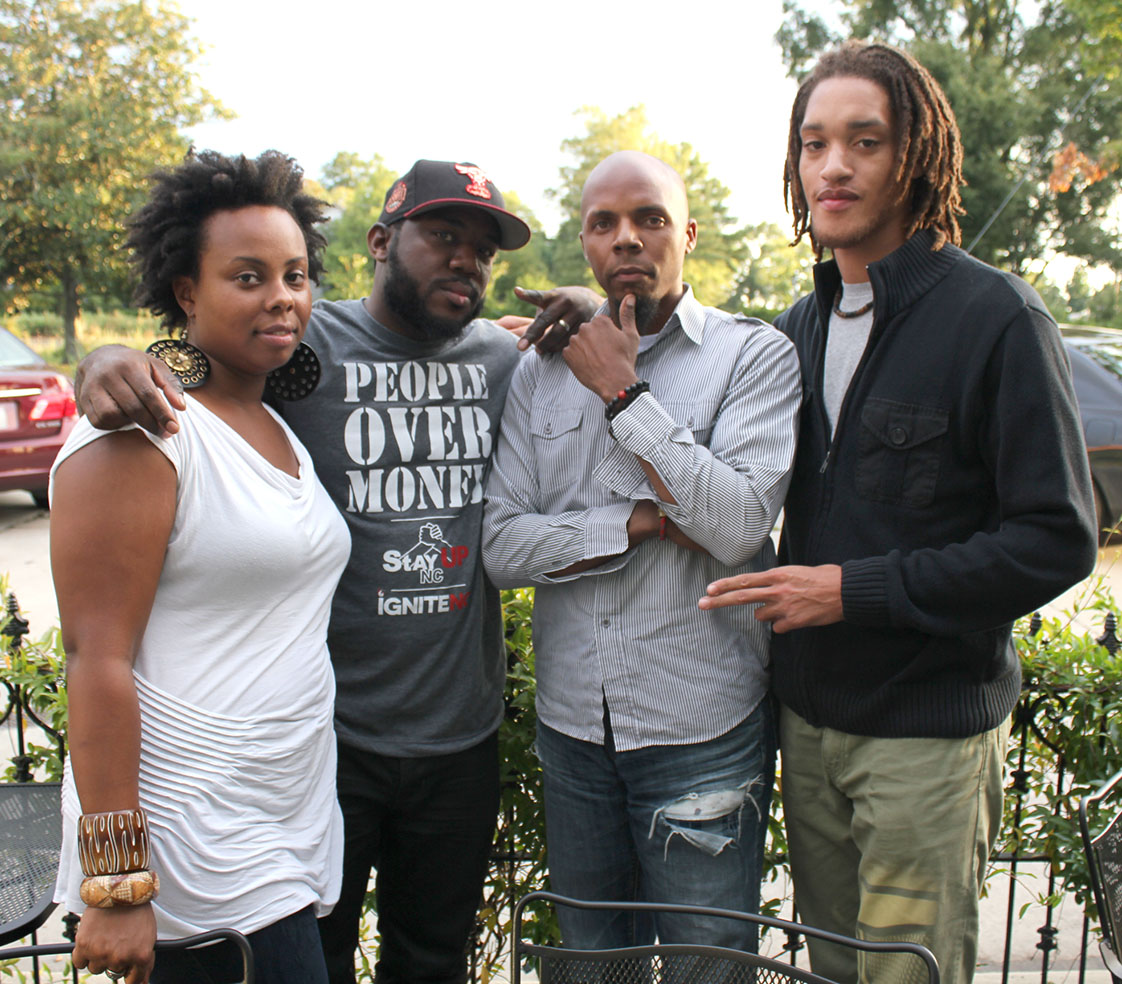
About 300 people gathered in front of the old downtown courthouse on Aug. 14.
They were assembling for the National Moment of Silence—commemorating the death of unarmed teen Michael Brown, who was killed by a Ferguson, Missouri, police officer five days earlier.

Organizers, left to right, Layla Brown, Joshua Vincent, Lamont Lilly and Darrell Johnson plan to continue community conversations and action around police accountability. (Staff photo by Mary Alta Feddeman)
It was a solemn meeting, where organizers and attendees spoke about police treatment in Ferguson and the effects of events like Brown’s death on the country as a whole.
Two spoken word pieces were performed, one by local organizer Joshua Vincent, who wrote a poem about the aftermath of Brown’s death in Ferguson just days earlier.
The poem ended with the sentence, “We deserve protection from the police.”
At the end of the event, one organizer started a chant, and the crowd followed:
“Dear Michael Brown, we won’t stand down,” the people chanted.
And the organizers of the event certainly have no plans to stand down.
Vincent, along with his wife Layla Brown, Darrell Johnson and Lamont Lilly got together at JC’s Kitchen on the corner of East Main and Fayetteville streets to begin organizing the event just a few days before it took place.
“I just kind of took initiative because I didn’t see anyone else organizing around it locally,” said Johnson.
Two other gatherings for the National Moment of Silence took place in the state—one in Charlotte and one in Greensboro, Vincent said.
“Essentially, it was kind of like a dream team that was put together of organizers and intellectuals and just activists—people who were concerned about the community and people who were concerned about police brutality and police accountability, specifically—from that point on,” Vincent said.
“And so we’ve been continuously kind of just building that circle and making it fortified.”
This “dream team” he referred to is in the process of forming a new, lasting organization of social justice advocates.
Larry Smith, the Deputy Chief of Operations at the Durham Police Department, said that the DPD is working to become increasingly accountable to the public.
“We think we have been very accountable to our public in the past. and we’re open to any reasonable ideas that we think will improve that,” Smith said. “And we’ve been working with the manager’s office as well as the [Human Relations] Commission, many of which were already implemented, and some we’re already implementing and will continue to implement.”
Lilly said Durham’s police accountability organizing efforts really took off with the case of Stephanie Nickerson in November of 2012.
Lilly said that Nickerson, a 25-year-old Durham woman, was having a gathering at her house when the Durham police asked to search her home without a warrant.
Nickerson was beaten by an officer when she refused to put her hands behind her back, Lilly said. She was then charged with resisting arrest and assaulting an officer.
The charges were eventually dropped, and the officer resigned.
“It was really myself…and a few others who really got this off the ground and rallied around her case,” Lilly said.
Lilly also said that the NAACP got involved, as did the Southern Coalition for Social Justice and other organizations that seek to bring accountability to police treatment of citizens.
After Nickerson’s case, the case of Carlos Riley Jr. and the deaths of Jose Ocampo, Derrek Walker and Jesus Huerta all followed within about one year.
The most recent case of 17-year-old Jesus Huerta’s death while in police custody sparked a string of protests in the community, culminating on Nov. 22 when Durham police tear-gassed protestors, Lilly said.
He also said that the tear gas and smoke bombs were the police reaction to a few protesters who had damaged police vehicles during the protest.
The protest soon garnered national news coverage.
Lilly said that what has been happening in Ferguson reminds him and other community members of that evening in November.
“The protesters were not at all prepared for any of it. We scattered like roaches,” Lilly said.
“People scattered for their own personal safety.”
Lilly also said that the protest led to city officials focusing more intently on the way the Durham Police Department treats citizens.
The efforts of this nascent organization of activists dovetails with the work of FADE—an organization whose name stands for Fostering Alternative Drug Enforcement—and its recent list of recommendations to the Durham City Council.
The list included a mandate that written consent forms be used for all police searches and designated marijuana possession as the city’s lowest priority for law enforcement.
Vincent acknowledged the need for approaching the issue from multiple angles, with organizations like FADE focusing more on the issue from a policy angle, while others organize around a more grassroots method.
“We’re not just a group of young idealistic black kids who don’t know what we’re doing. We know what we’re doing, and we’re aware of the history,” Vincent said.
“We’re aware of the theoretical framework in which all of these oppressions exist. And each of us come to the table with a very specific set of skills.”
Lilly also emphasized the importance of race in police accountability.
“We have to recognize the element of white privilege,” Lilly said, adding: “For some people, police brutality just doesn’t exist because, ‘Hey, it’s not a part of my daily life. It’s not the bags that I’ve been carrying since I was seven years old.’”
Layla Brown said she also wants young people in the community to be aware that they are not alone in their concern about race-based police treatment.
“People are doing the work,” Layla Brown said, concluding, “But the end game that probably is the most clear is something that we probably won’t see in our lifetime.”
MeMe says:
….We may not be able to impact all surrounding communities & the entire world but we must do our part to change & impact our own community….(704) 465.8435 CEO of Community Leaders of Durham, NC… (I have to be the voice for my community before I can effectively be someone else voice)